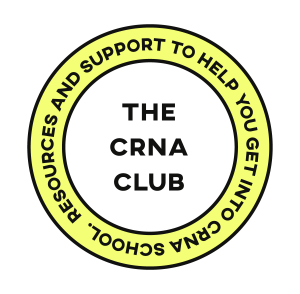You get seconds before your CRNA school resume is thrown in the Yes or No pile. You've spent months, if not years working on your application packet. You’ve retaken science classes, you've joined committees, you’ve volunteered, you've taken on leadership roles. How do you avoid making mistakes that will overshadow all the hard work you've done? Read on to find out!
Three mistakes to avoid on your CRNA school resume
1. Don’t Bury The Good Stuff
The first page of your resume is prime real estate, it's the creme-de-la-creme, its the big kahuna (sorry, I’m from Hawaii, ok?). Imagine the person who is reading your resume has just spent hours and hours scanning the application packets of people who are pretty much veeerrryyy similar when it comes down to it. Sorry, but it's true. Are they really going to take the time to read every single word on every single line of your resume? Sorry, but they're not. You're getting 1-2 minutes tops, if not just seconds, of mere skimming. Devastating, I know.
So if I asked you, what are the top three things the program should know about you what would you say? THOSE things should be on the front page of your resume.
Were you a clinical instructor for undergraduate nursing students? Did you assist with any research studies? Do you have experience as a flight nurse or a firefighter? What stands out that makes you different? Was it your extensive leadership roles serving as a preceptor or a CPR instructor or a leader on a hospital-wide task force.
Or do you have lots and lots of hours volunteering? Did you go on multiple medical missions trips? What are the things that you're most proud of, that should go on the first page.
Yes, traditionally resumes start off by listing your education at the top and then any certifications, like your CCRN and ACLS. Depending on how many degrees and certifications you have, you're now likely through 1/2 of your first page or maybe 3/4 of the way to the bottom of your first page.
That means you have a small section of real estate to work with to really capture their attention and highlight some things that you don't want them to miss.
You don't necessarily need to put your work experience next. You're going to have ICU experience they know that.
Think about what you don’t want them to miss. Your leadership roles? Your involvement in research? Were you the recipient of any major awards? Put that next.
2. Avoid Repetition
Avoid repeating yourself. Let me say it again- avoid repetition! (Sorry, I couldn’t resist!)
In particular, I see a lot of repetition under the “Employment” section. If you were a travel nurse, or if you worked at several hospitals, in several ICU's, it's possible that you did a lot of the same things at each place. If you cared for patients on mechanical ventilation, with invasive lines, on vasoactive infusion, don't repeat that under every single unit that you worked on. You're just making your resume longer, and longer, and boring to read.
If you have more than three work experiences that have similar skills and patient populations, I would recommend extracting those core sets of skills and putting it at the top of your Employment section and titling it “Skills.” One of our resume templates that we created is specifically designed for this type of applicant, the one that has a long work history and has a lot of similar skills that they have used, for each facility that they have worked with.
One of the benefits of doing it this way, is right off the bat you're letting the admissions committee know that you're taking care of high acuity, sick patients. They are seeing at the top of your employment section, that you have ECMO experience, CRRT experience, you're proficient at managing arterial lines, CVP and PA catheters.
Now in their mind they know that you're taking care of sick patients anything else that they read from this point on is now bonus an extra. We don't know if they're going to finish reading your application so we need to make sure we are prioritizing the most important things higher up in your resume and for the admissions committee to know that you're taking care of the most critically ill patients is extremely high priority. So this is really one of my favorite strategies and again that is to extract some of those core experiences out and put it in its own designated section at the top of your employment or your experience section and label it as “skills”.
3. Don’t be Fluffy
I have seen multiple 1-page resumes score interviews. Just because your resume is longer does not mean it is more effective. If you're putting fluff into your resume you're doing two detrimental things. Number one, you're boring your reader; number two, you're taking away from the things that you actually want the admissions committee to notice. When we're reading resumes, when we're reading personal essays, even during our interview there is just so much noise. Our attention spans are short, we really need to make sure that every single word that goes on your resume and your personal essay has a purpose and an intention.
You don't need to tell the admissions committee that you're collaborating with the multidisciplinary team to provide quality patient care. You don't need to tell the admissions committee that you're providing excellent management a critically ill patients. What you do need to tell them? You need to tell them that you improved patient outcomes, you increased unit efficiencies, you implemented a cost-saving measure, you led a team, you improved responsiveness of staff, you improved safety or decreased risk. These are the types of things that will make you stand out.
Conclusion
Your resume is a huge piece of the puzzle. If you're going to spend countless hours, and even years of stress and dedication to doing things to help yourself to stand out on your CRNA school application, you don't want to have the admissions committee just skim over it and miss your biggest points completely. An effective, clear, concise and skimmable resume is such a key piece of getting an interview.


